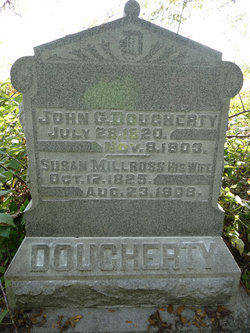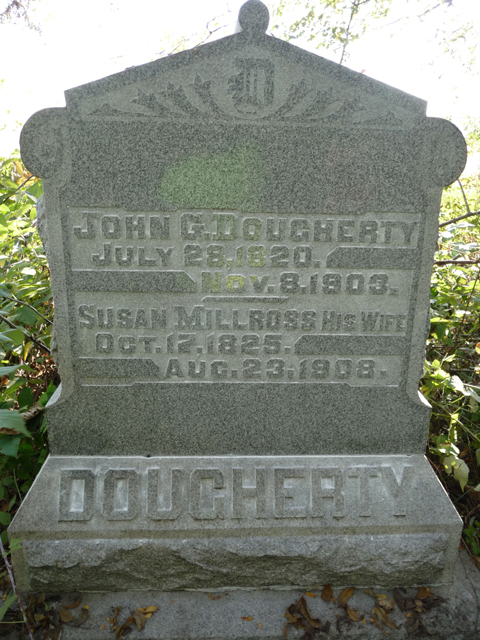Jerseyville Republican
Died 11-1903. John G. Dougherty, born in Adams County, Mississippi, July 28, 1820, second son of Wm. & Jeanette Mariah A. (Fowler) Dougherty. His parents were dissatisfied with the conditions prevailing in the south and entertaining profound convictions against slavery, decided to seek a home in the north. In the spring of 1832, they came up the Mississippi River and settled at Belleville, Illinois. The were induced largely through the influence of Dr. Hamilton then of Otter Creek Township, but now long since deceased, to migrate in the fall of that same year to Jersey County. They located land which to his day comprises a part of the homestead. William, the father, died leaving his large family dependent upon his widow, and a very important degree, upon the subject of this sketch, then only 14. The country was new and the family had to be fed. The little patches of ground already grubbed from the forest had to be tilled, trees felled, and brush had to be cleared from still other acres. The family had to be schooled and the mortgage had to be paid. There was no time from his father's death to his own demise 2 days ago, when he did not stand as the faithful and unflinching protector of his father's family. He kept his mother by his side until she was called hence September 3, 1862. He married Susan (Millross) Dougherty April 27, 1848. She was a native of Haddington, Scotland, but then a resident of Jersey County. Parents of 8 children: Junius, who died in infancy, Louisa Maria, wife of Hon. J. K. Cadwallader, George Henry, William, Irene Sliza, wife of Dr. Charles A. L. Reed, of Cincinnati, Anna Jeanette, who died early in life, Leonora, wife of Milton B. Noble and John George; 15 grandchildren. Intellectual acuteness, moral principles and political principles entertained by his parents, made it natural for Mr. Dougherty, upon the attainment of his majority he should identify himself with the Whig party, the only party then opposed to the extension of slavery. It was only natural that upon the dissolution of that party, that the subject of the sketch, revolted at the recollection of slavery that surrounded him in his childhood, found himself a sympathizer of Birney in the early abolition movement.
Jerseyville Republican
Died 11-1903. John G. Dougherty, born in Adams County, Mississippi, July 28, 1820, second son of Wm. & Jeanette Mariah A. (Fowler) Dougherty. His parents were dissatisfied with the conditions prevailing in the south and entertaining profound convictions against slavery, decided to seek a home in the north. In the spring of 1832, they came up the Mississippi River and settled at Belleville, Illinois. The were induced largely through the influence of Dr. Hamilton then of Otter Creek Township, but now long since deceased, to migrate in the fall of that same year to Jersey County. They located land which to his day comprises a part of the homestead. William, the father, died leaving his large family dependent upon his widow, and a very important degree, upon the subject of this sketch, then only 14. The country was new and the family had to be fed. The little patches of ground already grubbed from the forest had to be tilled, trees felled, and brush had to be cleared from still other acres. The family had to be schooled and the mortgage had to be paid. There was no time from his father's death to his own demise 2 days ago, when he did not stand as the faithful and unflinching protector of his father's family. He kept his mother by his side until she was called hence September 3, 1862. He married Susan (Millross) Dougherty April 27, 1848. She was a native of Haddington, Scotland, but then a resident of Jersey County. Parents of 8 children: Junius, who died in infancy, Louisa Maria, wife of Hon. J. K. Cadwallader, George Henry, William, Irene Sliza, wife of Dr. Charles A. L. Reed, of Cincinnati, Anna Jeanette, who died early in life, Leonora, wife of Milton B. Noble and John George; 15 grandchildren. Intellectual acuteness, moral principles and political principles entertained by his parents, made it natural for Mr. Dougherty, upon the attainment of his majority he should identify himself with the Whig party, the only party then opposed to the extension of slavery. It was only natural that upon the dissolution of that party, that the subject of the sketch, revolted at the recollection of slavery that surrounded him in his childhood, found himself a sympathizer of Birney in the early abolition movement.
Family Members
Sponsored by Ancestry
Advertisement
Records on Ancestry
Advertisement






















